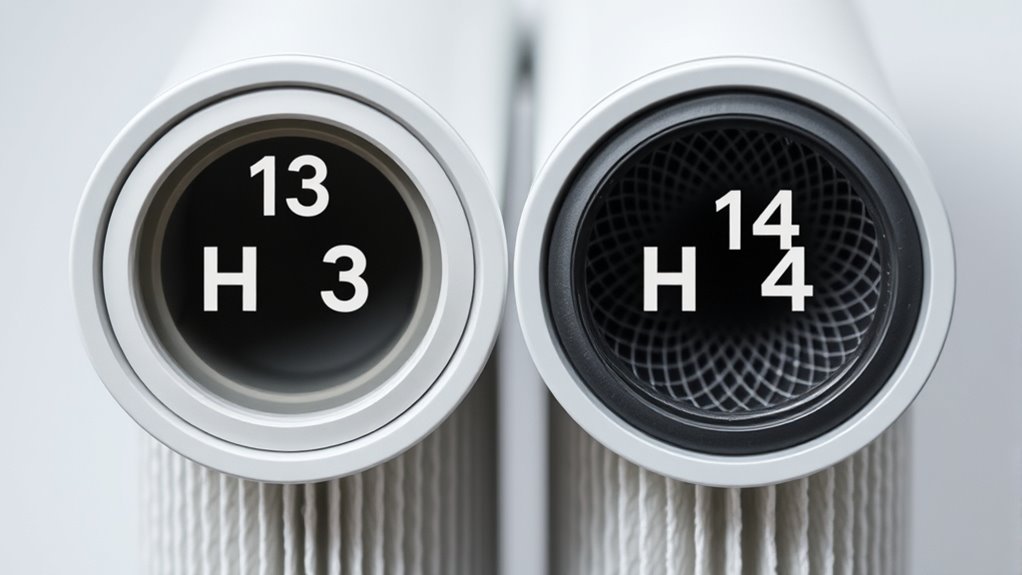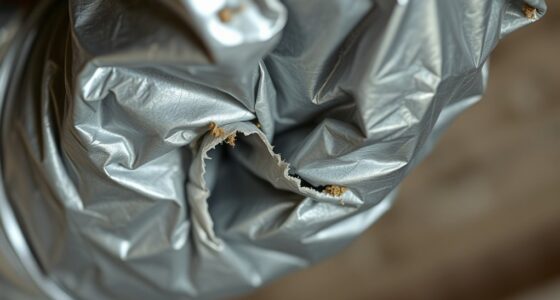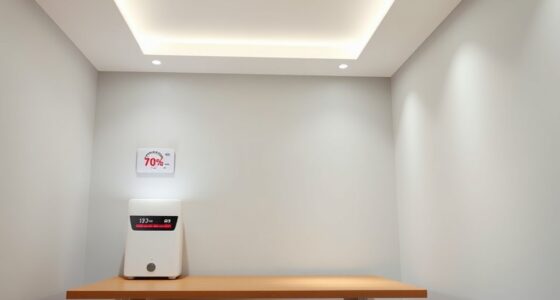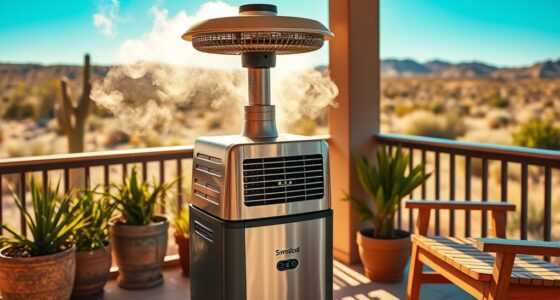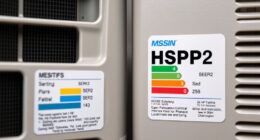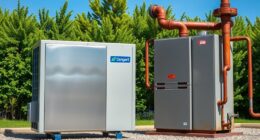Choosing between H13 and H14 HEPA filters depends on your air quality needs. H14 filters trap nearly 99.995% of tiny particles like viruses, bacteria, and allergens, making them ideal for highly sensitive environments or those with health concerns. H13 filters are effective but slightly less thorough. If you want the highest protection and cleaner indoor air, H14 is worth considering—if you want to understand how to select the right filter, keep exploring below.
Key Takeaways
- H14 filters trap 99.995% of 0.1-micron particles, offering superior filtration over H13’s 99.95% at 0.3 microns.
- Higher-grade H14 filters are ideal for sensitive environments like hospitals or labs needing maximum air purity.
- H14 filters generally last longer and reduce replacement costs despite higher initial investment.
- Upgrading to H14 provides better protection against viruses, bacteria, and microscopic allergens.
- The need for H14 depends on your air quality concerns; for general use, H13 may suffice.
Understanding the Basics of HEPA Filtration

HEPA filters are designed to trap tiny particles from the air, providing cleaner and healthier indoor environments. To keep your air purifier working effectively, understanding air purifier maintenance is essential, especially when it comes to the HEPA filter lifespan. Regularly replacing or cleaning your filter ensures ideal filtration and avoids strain on the device. HEPA filters are rated to capture 99.97% of particles as small as 0.3 microns, making them highly efficient for allergy and asthma sufferers. The filter’s lifespan varies depending on usage and air quality, but typically, it lasts between 6 to 12 months. Proper maintenance not only prolongs the filter’s life but also guarantees that your air purifier continues to deliver purified, healthy air every day.
What Do H13 and H14 Ratings Mean?
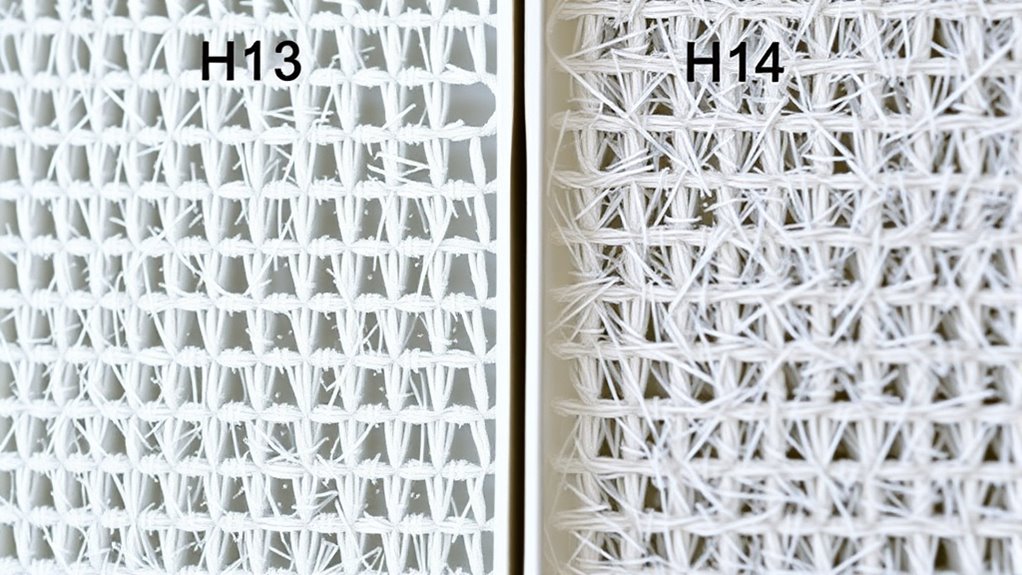
Understanding what H13 and H14 ratings mean is essential when choosing the right air filtration system. These ratings indicate the level of filtration efficiency, with H13 capturing 99.95% of particles as small as 0.3 microns, and H14 capturing at least 99.995%. When doing an air purifier comparison, you’ll notice that higher ratings often mean better contaminant removal. Keep in mind, H14 filters generally require less frequent replacement because they trap more particles efficiently. This can save you money and reduce maintenance over time. Knowing these differences helps you select a filter suited to your needs, whether for everyday air quality or specialized environments. Additionally, understanding sector performance metrics can help evaluate the long-term benefits of higher-grade filters in specific settings. Ultimately, understanding the ratings guides you to a balance between filtration performance and filter replacement frequency.
Key Differences in Filtration Efficiency
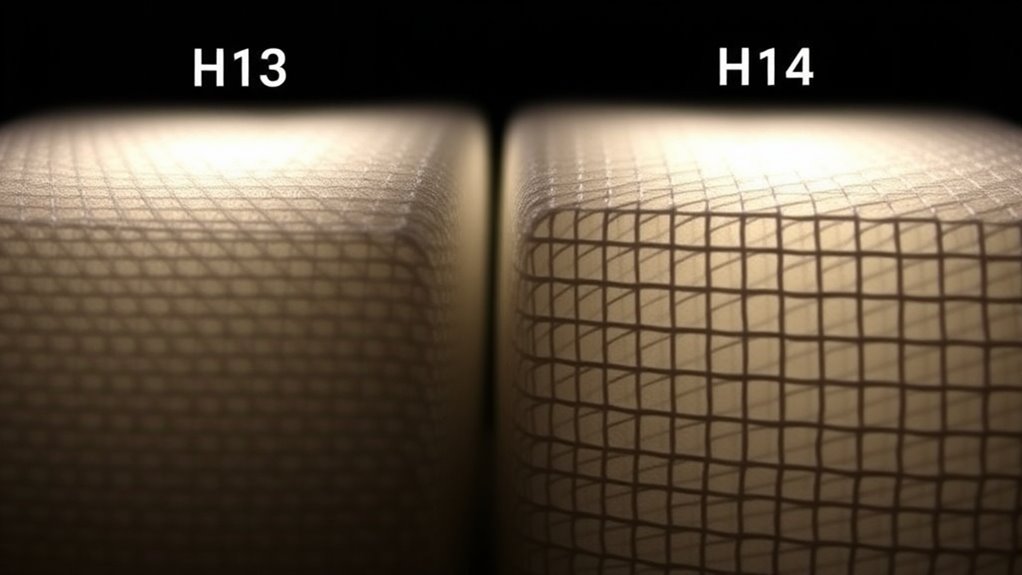
The key differences in filtration efficiency between H13 and H14 filters determine how well they remove microscopic particles from the air. H14 filters trap 99.995% of particles at 0.3 microns, slightly outperforming H13 filters that trap about 99.95%. This means H14 filters provide a higher level of purification, especially important in sensitive environments. You need to take into account air purifier maintenance because more efficient filters may clog faster, affecting HEPA filter lifespan. Regularly changing or cleaning your filters ensures peak performance and maintains their filtration efficiency. While H14 filters offer superior particle removal, they might require more frequent replacement, impacting long-term costs. Knowing these differences helps you choose the right filter based on your air quality needs and maintenance preferences. Additionally, understanding the filter technology used in these HEPA filters can help you better evaluate their effectiveness and suitability for your specific needs.
Applications and Environments for H13 and H14 Filters
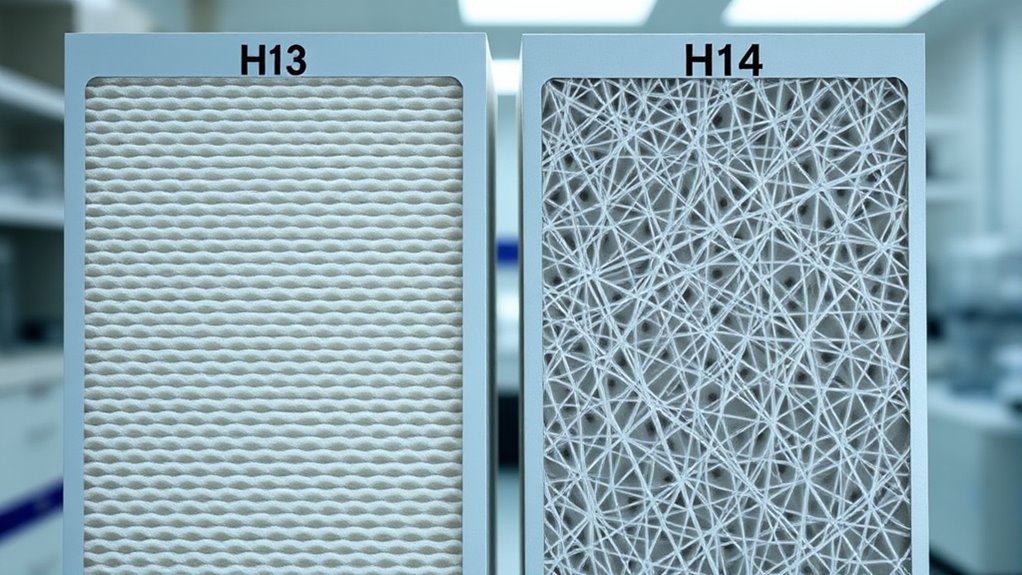
H13 and H14 filters are used in various settings where air purity is critical. You’ll find them in medical facilities, cleanrooms, laboratories, and industrial spaces. Understanding their applications helps you choose the right filter for each environment. Additionally, the filter quality can significantly impact the effectiveness of air purification systems in these environments.
Medical and Healthcare Settings
In medical and healthcare settings, H13 and H14 HEPA filters play a crucial role in maintaining sterile environments and protecting patients and staff from airborne contaminants. They ensure high-quality air purification, which directly supports respiratory health. These filters trap bacteria, viruses, and allergens, reducing infection risks. Choosing the right filter depends on the level of contamination and safety requirements.
| Application Area | Filter Grade | Purpose | Effectiveness |
|---|---|---|---|
| Operating Rooms | H13 | Minimize airborne pathogens | High |
| Isolation Wards | H14 | Maximize containment of airborne hazards | Very High |
| Patient Recovery Areas | H13 | Support clean air for healing | Moderate to High |
| General Healthcare | H13 or H14 | Maintain air quality standards | Varies |
Cleanroom and Laboratory Use
When maintaining ultra-clean environments in cleanrooms and laboratories, selecting the right HEPA filter is crucial to guarantee air purity and prevent contamination. H13 and H14 filters excel in these settings by providing high-efficiency particle removal, essential for sensitive applications. Proper airflow optimization ensures consistent air movement, reducing dead spots and ensuring all areas are protected. Regular filter maintenance is vital to sustain filtration performance and prevent bypass contamination. With H14 filters offering slightly higher filtration efficiency, they are ideal for environments with stricter standards or hazardous materials. Your choice depends on your specific cleanroom requirements, but both filters help maintain the integrity of your environment through effective air filtration, optimized airflow, and diligent maintenance.
Industrial and Commercial Environments
Choosing the right HEPA filter for industrial and commercial environments depends on the specific air quality demands of your operation. H13 and H14 filters excel in settings where removing airborne contaminants is critical. Imagine:
- Manufacturing plants with sensitive electronics requiring spotless air.
- Healthcare facilities maintaining sterile environments.
- Data centers preventing dust from damaging equipment.
- Commercial spaces needing improved air quality for employees and customers.
In these environments, filter maintenance is essential to sustain excellent performance. Higher-grade filters like H14 may be necessary for ultra-pure air, while H13 can suffice for less critical applications. Selecting the appropriate filter ensures clean air, reduces contamination risks, and maintains consistent air quality standards. Additionally, understanding filter categories can help you make informed decisions about the level of filtration required.
Performance in Capturing Tiny Particles and Allergens
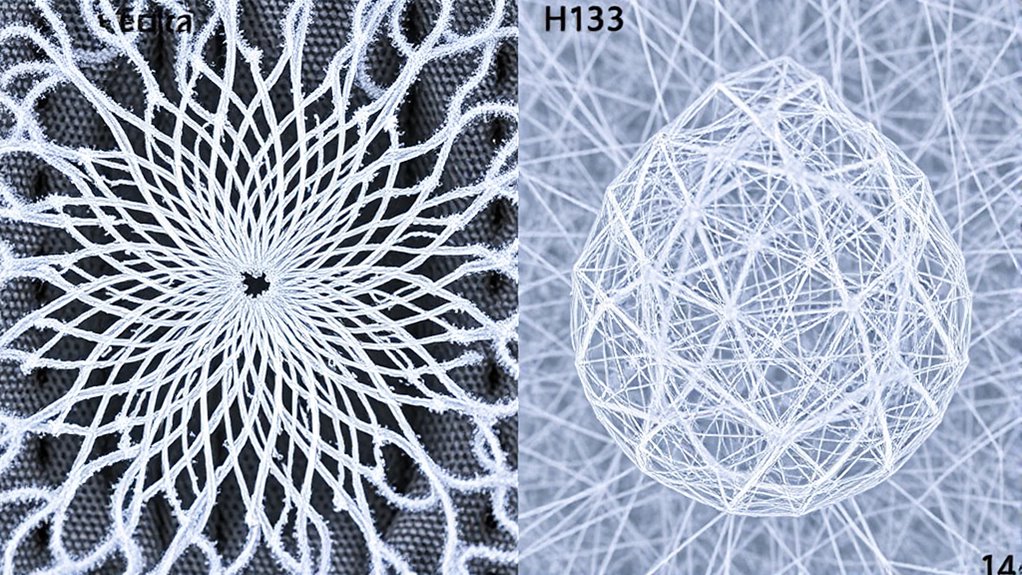
You want to know which filter better captures tiny particles and allergens. H13 and H14 filters differ in their particle capture efficiency and allergen removal effectiveness. Understanding these differences helps you choose the right filter for cleaner, healthier air. Notably, H14 filters can remove a higher percentage of very small particles, making them more suitable for environments requiring advanced filtration capabilities.
Particle Capture Efficiency
How well do H13 and H14 HEPA filters differ in capturing tiny particles and allergens? H14 filters excel at trapping nearly 99.995% of particles as small as 0.1 microns, considerably boosting your air quality. Imagine:
- Microscopic pollen grains getting caught before they reach your lungs
- Dust mites and pet dander being filtered out at a molecular level
- Bacteria and viruses trapped efficiently, reducing health risks
- Fine smoke particles captured to improve indoor freshness
- The filtration efficiency of H14 filters allows them to perform better in environments requiring higher purity, making them suitable for medical or sensitive settings.
Choosing the right filter impacts not only air quality but also filter lifespan. An H14 filter may last longer because it traps more particles before clogging, maintaining performance over time. This efficiency ensures cleaner air and sustained effectiveness for your environment.
Allergen Removal Effectiveness
When it comes to allergen removal, H14 HEPA filters outperform H13 models by capturing a higher percentage of tiny particles and allergens. This means you’ll experience cleaner air and fewer allergy symptoms, especially in sensitive environments. To maintain peak allergen removal effectiveness, regular air purifier maintenance is essential, as clogged or dirty filters reduce performance. Although H14 filters generally have a longer HEPA filter lifespan, neglecting timely replacements can diminish their efficiency. Investing in an H14 filter ensures better allergen capture, but only if you stay consistent with maintenance. Keep in mind, the higher the filter grade, the more diligent you’ll need to be about filter replacement and cleaning to preserve its ability to trap microscopic allergens effectively.
Cost Considerations and Value for Money

While H13 filters generally have a lower upfront cost, H14 filters often offer better long-term value due to their higher efficiency and longer lifespan. When doing a cost analysis, consider these factors:
- Initial purchase price, which affects immediate expenses
- Filter replacement frequency, impacting ongoing costs
- Energy efficiency, influencing your utility bills
- Overall durability, determining how often you need replacements
A thorough value assessment shows that investing in H14 filters can save you money over time, despite the higher initial investment. You’ll benefit from fewer replacements, lower energy use, and improved filtration performance. Additionally, filtration efficiency plays a crucial role in ensuring cleaner air and better health protection. This approach ensures you’re making a smart choice that balances upfront costs with long-term savings and health benefits.
How to Determine Your Specific Filtration Needs
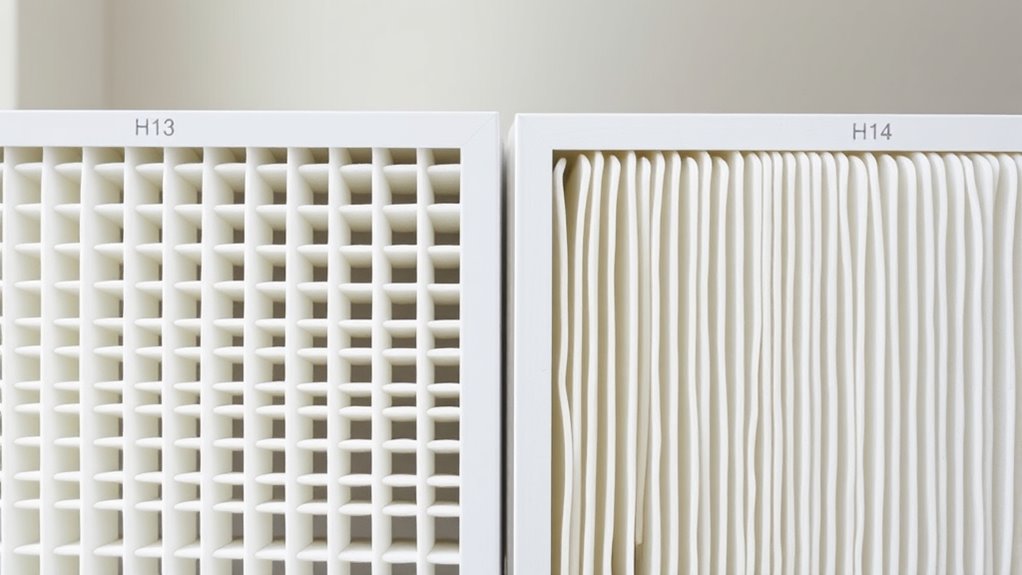
Choosing the right HEPA filter depends on understanding your specific air quality needs and usage environment. To do this, consider the pollutants you’re dealing with, the size of your space, and how often you’ll run your filtration system. For example, if you have allergies or asthma, a higher-grade filter may be necessary. Also, think about the filter lifespan; a longer lifespan reduces replacement frequency and costs. Use this quick reference:
| Air Quality Concern | Space Size | Filter Lifespan |
|---|---|---|
| Dust and allergens | Small | 6-12 months |
| Mold spores | Medium | 12-18 months |
| Bacteria or viruses | Large | 6-12 months |
| Pet dander | Any | 12 months |
| Chemical fumes | Specific needs | Varies |
Matching these factors helps you choose the best HEPA grade for your needs. Considering regulatory standards can also ensure your filter meets safety and performance criteria.
Potential Benefits of Upgrading to H14

Considering an upgrade to H14 HEPA filters can greatly enhance your air purification system’s performance. With H14 filters, you’ll notice improvements like:
- Cleaner air, with fewer allergens and pollutants lingering
- Reduced airborne bacteria and viruses, creating a safer environment
- Longer filter lifespan, meaning less frequent replacements and lower maintenance costs
- Consistent air quality over time, ensuring your space stays healthier
- Incorporating AI-driven monitoring can help optimize filter performance and maintenance schedules safety measures.
These benefits mean your air quality will improve markedly, making a real difference for sensitive individuals or high-traffic areas. Upgrading to H14 filters ensures you get more efficient filtration, which can lead to healthier indoor air and a more reliable system. Plus, the extended filter lifespan offers cost savings and less hassle in the long run.
Making the Right Choice for Your Space
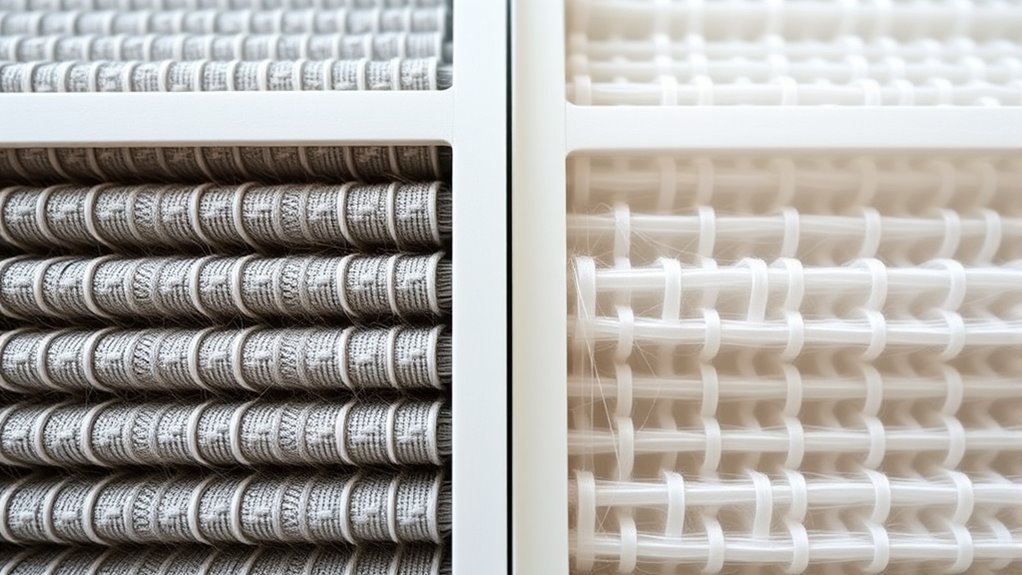
Selecting the right HEPA filter for your space depends on evaluating your specific needs and environment. Consider the level of air quality you require—if you’re in a sensitive setting like a medical facility or cleanroom, an H14 filter might be necessary. For general spaces, an H13 filter often provides sufficient air purification. Also, think about filter maintenance; higher-grade filters like H14 may require more frequent replacements and careful handling. Balancing air quality with maintenance costs ensures you choose a filter that fits your budget and performance needs. Additionally, understanding the differences in filter efficiency ratings can help you select the most appropriate option for your situation. Ultimately, examining your environment’s air quality demands and maintenance capacity helps you make an informed decision, ensuring effective filtration without unnecessary expense or effort.
Frequently Asked Questions
How Long Do H13 and H14 Filters Typically Last Before Replacement?
H13 filters typically last around 6 to 12 months, while H14 filters can last slightly longer, usually up to 12 months, depending on usage. Your filter lifespan depends on factors like air quality and usage frequency. To maintain peak performance, check your manufacturer’s recommended replacement frequency and replace filters promptly when they reach their lifespan. Regular replacements ensure your air remains clean and protected.
Are H14 Filters Compatible With Standard HVAC Systems?
Yes, H14 filters are generally compatible with standard HVAC systems, but you should verify your system’s filter compatibility and system integration before installing. Some units may require modifications or specific filter sizes to guarantee proper fit and function. Always consult your HVAC manufacturer’s guidelines or a professional technician to confirm that an H14 filter will work safely and effectively with your existing system.
Do H14 Filters Produce More Airflow Resistance Than H13 Filters?
Imagine air flowing smoothly through a gentle stream—you’ll notice that H14 filters, with their denser fibers, do create slightly more airflow resistance than H13 filters. This impacts airflow efficiency, making it feel a bit more restricted. However, both filters are compatible with standard HVAC systems, so you won’t have to worry about filter compatibility. Just be aware that higher-grade filters might require a bit more power to keep the air moving.
Can H14 Filters Be Used in Residential Air Purifiers Effectively?
Yes, H14 filters can be used effectively in residential air purifiers, provided they are compatible with your unit. You should check residential compatibility to guarantee proper fit and performance. Keep in mind that filter installation might require adjustments or specific handling due to the higher filtration efficiency. While H14 filters offer superior air purity, confirm your air purifier’s design accommodates them for maximum results and avoid airflow resistance issues.
What Environmental Factors Impact the Performance of H13 and H14 Filters?
You might think environmental factors don’t matter, but humidity effects and dust accumulation can considerably impact your HEPA filters’ performance. High humidity can cause mold growth and reduce filtration efficiency, while dust buildup clogs the filter pores, lowering airflow and purification capacity. Both H13 and H14 filters are sensitive to these factors, so it’s crucial to maintain ideal humidity levels and regularly clean or replace your filters to guarantee they work effectively.
Conclusion
Ultimately, choosing between H13 and H14 filters depends on your specific needs. If you’re aiming for the highest level of clean air, upgrading might be worth the investment. However, don’t assume more is always better—know your space and requirements first. Sometimes, less is more, so weigh the benefits carefully. Remember, the best filter is the one that fits your situation without breaking the bank.
